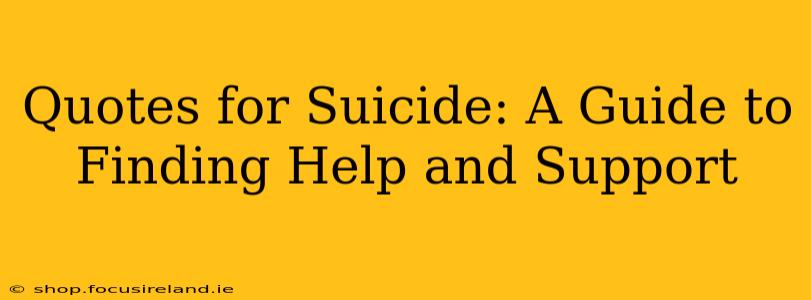Suicidal thoughts are incredibly painful and isolating. If you're struggling, please know you're not alone, and help is available. This article explores the complexities surrounding quotes about suicide, examining their impact and providing crucial resources for those in need. We'll delve into why such quotes can be both harmful and helpful, depending on context and individual circumstances. Remember, seeking help is a sign of strength, not weakness.
Why People Share Quotes About Suicide
Many people share quotes about suicide for various reasons. Some might find solace in relatable expressions of despair, feeling understood in their struggles. Others might use these quotes to initiate conversations about mental health, hoping to break the stigma surrounding suicide. However, it’s crucial to understand that the impact of such quotes can vary greatly, and their potential for harm necessitates careful consideration.
Are Quotes About Suicide Harmful?
Yes, quotes about suicide can be harmful, particularly for vulnerable individuals already contemplating self-harm. Exposure to such quotes can normalize suicidal ideation, romanticize death, or even provide a perceived "blueprint" for suicide. The language used in some quotes can be triggering, potentially leading to increased feelings of hopelessness and despair. It’s important to remember that suicide is not a solution; it’s a tragic consequence of untreated mental health conditions.
Can Quotes About Suicide Be Helpful?
In certain contexts, quotes about suicide can be helpful. For instance, a quote that accurately reflects the pain and despair of suicidal thoughts can help someone feel less isolated and alone in their experience. This validation can be a crucial first step towards seeking help. However, it's essential that such quotes are presented alongside resources and support information. The focus should always be on hope, recovery, and the availability of help.
What to Do If You Encounter a Suicidal Quote Online
If you encounter a quote about suicide online, consider the following:
- Assess the context: Is the quote presented in a responsible manner, with resources and support information? Or is it presented in a way that might glorify or romanticize suicide?
- Report harmful content: If the quote is presented irresponsibly, report it to the platform where you found it. Many social media platforms have mechanisms for reporting harmful or triggering content.
- Focus on help: If you're struggling with suicidal thoughts yourself, or if you're concerned about someone else, seek immediate help.
Where to Find Help and Support
If you or someone you know is struggling with suicidal thoughts, please reach out for help immediately. There are many resources available:
- National Suicide Prevention Lifeline: 988 (in the US)
- Crisis Text Line: Text HOME to 741741 (in the US)
- The Trevor Project: Provides crisis intervention and suicide prevention services to LGBTQ young people.
- The Jed Foundation: Works to protect emotional health and prevent suicide for teens and young adults.
- SAMHSA's National Helpline: 1-800-662-HELP (4357)
How to Help Someone Who is Suicidal
If you're concerned about someone who might be suicidal, take action. Listen to them without judgment, offer support, and encourage them to seek professional help. Don't be afraid to directly ask them if they're having thoughts of suicide. Your concern and support can make a significant difference.
Is it OK to Talk About Suicide?
Talking about suicide is crucial, provided it's done responsibly and with sensitivity. Open and honest conversations can help break down the stigma and encourage individuals to seek help. However, it's vital to avoid glorifying or romanticizing suicide. The focus should always be on support, hope, and recovery.
What are the Warning Signs of Suicide?
Recognizing warning signs is crucial in preventing suicide. These can include:
- Talking about wanting to die or kill themselves.
- Looking for ways to kill themselves.
- Talking about feeling hopeless or having no reason to live.
- Feeling trapped or in unbearable pain.
- Increased substance use.
- Withdrawing from friends and family.
- Giving away prized possessions.
- Extreme mood swings.
- Changes in sleep patterns.
If you notice any of these signs in yourself or someone you know, seek help immediately.
Remember, you are not alone. Help is available, and recovery is possible. Please reach out for support if you need it. Your life is valuable.

